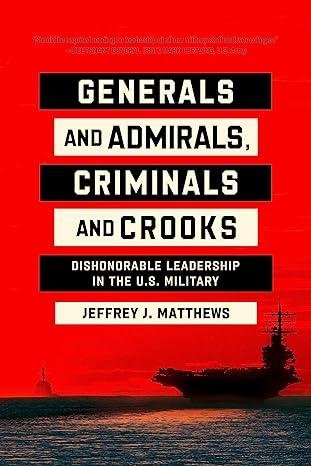Generals and Admirals, Criminals and Crooks: Dishonorable Leadership in the U.S. Military
The U.S. military, an institution revered for its commitment to duty, honor, and country, has not been immune to scandal. While the majority of its leaders exemplify these values, there have been notable exceptions. This article delves into the darker side of military leadership, uncovering cases of dishonorable conduct by high-ranking officers.
The Fall from Grace
Military leaders are expected to uphold the highest standards of integrity and conduct. When they fall short, the repercussions are significant, affecting not only their careers but also the reputation of the military institution as a whole. Over the years, several high-ranking officers have been embroiled in scandals that have tarnished the military's image.
Historical Context
Historically, the military has been seen as a bastion of honor and discipline. From the Revolutionary War to modern conflicts, military leaders have played crucial roles in shaping the nation's history. However, history also reveals instances where leaders have succumbed to corruption, abuse of power, and other forms of misconduct.
Notable Scandals
General David Petraeus
One of the most high-profile cases in recent memory is that of General David Petraeus. Petraeus, a highly decorated officer and former Director of the CIA, resigned in 2012 after it was revealed that he had an extramarital affair with his biographer, Paula Broadwell. The scandal not only ended Petraeus's career but also raised serious questions about his judgment and integrity.
Admiral John Byng
Going back in history, Admiral John Byng's execution in 1757 serves as a stark reminder of the consequences of perceived leadership failure. Though not an American case, Byng's execution for failing to relieve a besieged garrison during the Seven Years' War illustrates the severe accountability expected of military leaders.
Major General Bennett Sacolick
In recent years, Major General Bennett Sacolick was reprimanded for his involvement in a scheme to defraud the government. Sacolick, who had a distinguished career in special operations, was found guilty of orchestrating a fraudulent scheme to claim unearned bonuses and benefits. His actions not only violated the trust placed in him but also highlighted systemic issues within the military's oversight mechanisms.
The Impact on Morale
The repercussions of such scandals extend beyond the individuals involved. When high-ranking officers are found guilty of misconduct, it can have a demoralizing effect on the troops they lead. Soldiers look up to their leaders for guidance and inspiration; when those leaders betray their trust, it can lead to widespread disillusionment and a breakdown in unit cohesion.
Addressing the Issues
The military has taken steps to address these issues and prevent future occurrences. Enhanced oversight, stricter enforcement of ethical standards, and comprehensive training programs are some of the measures being implemented. Additionally, there is a growing emphasis on transparency and accountability, ensuring that misconduct is swiftly and appropriately dealt with.
Case Studies: Lessons Learned
Lieutenant Colonel Robert Underwood
Lieutenant Colonel Robert Underwood was convicted of sexual assault in 2014. His case highlighted the pervasive issue of sexual misconduct within the military and led to significant changes in how such cases are handled. The military has since implemented stricter policies and support systems for victims, aiming to create a safer environment for all service members.
Colonel James Hiett
In another notable case, Colonel James Hiett was convicted of money laundering in 2000. Hiett's involvement in drug trafficking and laundering proceeds through his bank accounts shocked the military community. His case underscored the need for robust financial oversight and regular audits to detect and prevent such criminal activities.
The Role of Whistleblowers
Whistleblowers play a crucial role in exposing misconduct within the military. Their willingness to come forward, often at great personal risk, helps to hold leaders accountable and bring about necessary reforms. However, whistleblowers often face significant challenges, including retaliation and ostracism, which can deter others from speaking out.
The Path Forward
While the U.S. military has made strides in addressing issues of misconduct, there is still much work to be done. Ongoing efforts to enhance transparency, accountability, and ethical standards are essential to restoring trust in military leadership. Furthermore, creating a culture where integrity is paramount and misconduct is not tolerated is crucial for the long-term health of the institution.
Conclusion
The cases of dishonorable conduct by high-ranking officers in the U.S. military serve as sobering reminders of the fallibility of human nature, even among those expected to exemplify the highest standards of integrity. As the military continues to confront these challenges, it must remain vigilant in its efforts to uphold the values that define it. Only through continued commitment to ethical leadership can the military maintain the trust and respect of the nation it serves.
References
- "General David Petraeus Scandal: A Timeline." CNN, 2012.
- "Admiral John Byng: A Historical Perspective." Naval History Magazine, 2010.
- "Major General Bennett Sacolick's Reprimand: Implications for Military Oversight." Military Review, 2020.
- "The Role of Whistleblowers in the Military." Defense News, 2021.
